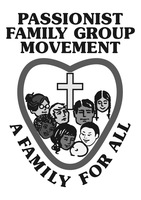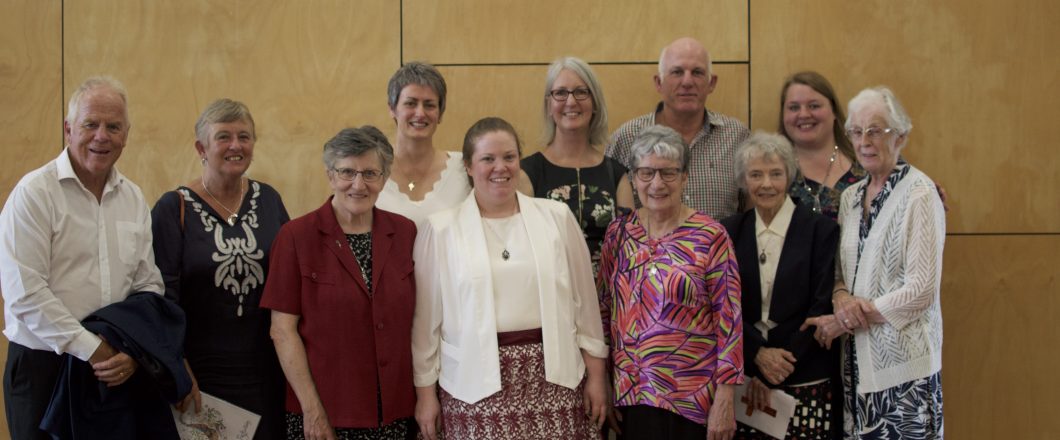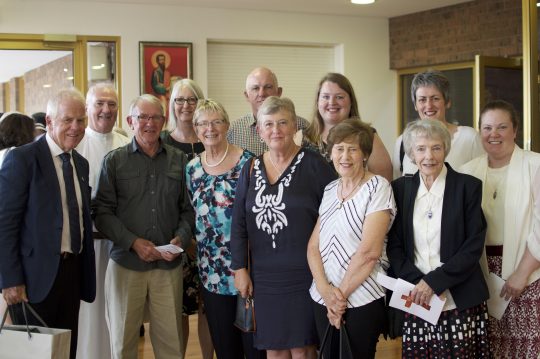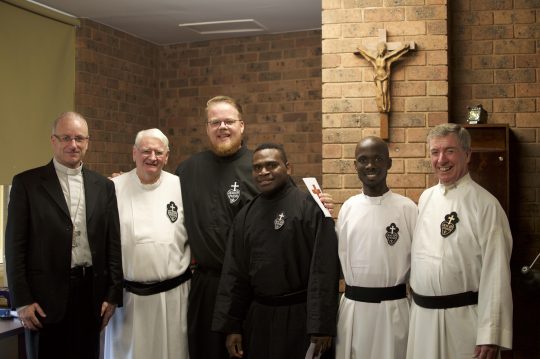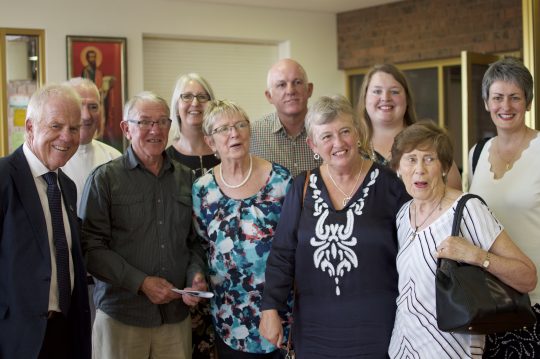Karen Lea Englebretsen celebrated the First Profession of ‘The Sisters of the Cross and Passion’ at St Paul Apostle Catholic Community, Endeavour Hills on Saturday 10th February.Bishop Charles Drennan from Palmerston North presided.Yes, we can claim Karen as our Kiwi girl!! And it was great to see others whom travelled over the ditch to be present supporting her for this great occasion.
Not only was it a pleasure and honour to attend her First Profession but also an enlightening time to reflect on God’s call to each one of us. I witnessed contributions to welcoming, readings, music, decorations, congratulations, encouragement and support, hospitality, meals, logistics of accommodate and transport for visitors etc.
However it was when Karen was standing acknowledging God’s call to her, responding ‘Yes I Do’ to the vows read that I felt really moved. Karen stood by herself (but not alone) freely vowing to Almighty God for 3 years – Chastity, Poverty and Obedience. Following this, sisters in the community, as signs of Commitment, faithfulness and service, presented symbols to her.
This has been a journey not like an engagement between a couple preparing for marriage, but a Spiritual journey. On this day Karen publicly committed to God her life. It’s a profound experience to witness and it filled my heart with great joy.
In joining the Sisters of the Cross and Passion Karen has committed her life to all those whom seek God’s loving care. To carry the light of Christ in today’s world.
Bishop Charles expressed in his homily …… God calls each of us. Our journey may be different to that of religious life, but the call is the same using the gifts we are trusted with.
Going forward we pray for Karen and each other that God surrounds us with friends and community that can support us in his work.
And may the Passion of Jesus Christ be always in our hearts. Linda Darbyshire
FEBRUARY 12, 2018
Homily preached on the occasion of Profession of First Vows of Karen Lea Englebretsen with the Sisters of the Cross and Passion St Paul Apostle parish, Endeavour Hills, Melbourne, 10 February 2018
(Is 43:1-7; Eph 3:14-21; Jn 15:1-12)
Today’s readings, carefully chosen for the occasion of Profession, bring into sharp focus three key threads of the fabric of our Christian life.
The great prophet Isaiah reminds us that God the Creator does not abandon us after creation to a random life but continues to calls us, to form and shape us every day. God is an artisan and we are God’s tapestry; the world God’s studio.
John in his Gospel describes that tapestry. It is a living project or mission. We are called to be a people of love which means to be a people of service, putting others first. And he cautions us: it’s not easy; ours is not a do-it-yourself project or pattern of life; Christian love is totally dependent upon our remaining immersed in the vine. Separated from God separated from Jesus we can do nothing, Christian. John the Evangelist leaves us on edge, alert to any tendency inside ourselves to think we can go it alone.
Balancing John’s caution is the magnificent passage from St Paul’s letter to the Ephesians. One of the most beautiful pieces of scripture, indeed of all literature ever: a prayer of complete trust that we might come to know and experience and relish the utter fullness of God.
So, we are a people called and formed, in order to love, with God’s all-encompassing embrace.
Those three threads stand at the heart of all Christian life. Today we might ask, where does Religious Life, the vowed life of consecration, fit within that whole?
It’s a good question. There is no one answer to it. But I think one insight is to see Religious Life as a kind of intensification of the everyday Christian life we all seek to live. In the Rite of Profession firstly our common Baptism is cited and honoured (all of us here have been consecrated to God at baptism) and then the desire to deepen or intensify that first consecration is stated as part of what Karen professes today.
In fact many Founders and Foundresses of Orders initially had no intention to form such a group. They simply were going about their ordinary Christian acts of charity – yes, often with extraordinary dedication. Nevertheless, what they did was simply the gospel call to serve. Then, in time, others – friends and acquaintances – wanted to help, and some chose to help not just occasionally but every day; and so regular helping for some became joining, committing. The origins of an Order emerged – a grouping, a community of mutual support and shared work, unified in prayer and invigorated in time with a spiritualty.
For Elizabeth Prout, or Mother Mary Joseph of Jesus (she seems to have had a bet each way there), the foundress of the Sisters of the Cross and Passion, the setting of the emergence of the Order was Manchester of the 1850s.
Manchester was nicknamed the Chimney of the world. The industrial revolution, the spread of railways, flourishing factories and mills had certainly put Manchester on the world map. But for the large majority of its inhabitants, and especially the droves of Irish labourers escaping famine, the cost was a wretched downtrodden disease infested life. Manchester was the very stuff of Dickens’ famous social novels. Friedrich Engels, of Karl Marx and Engles fame, the same age as Elizabeth, visiting Manchester in 1842, aged just 22, asked: what is to become of those populous millions who own nothing and consume today what they earned yesterday?
To that question Elizabeth Prout provided not a written answer but practical action. She stepped out and into that mix, all five feet of her, with sleeves rolled up. And soon others joined her, companions, visiting the sick and poor, teaching the mill and factory workers, at times even begging in order to survive.
Among those companions were two Passionist priests Fathers Gaudentius Rossi and Ignatius Spencer. No doubt their spiritual well, drawing upon St Paul of the Cross, Founder of the Passionist Fathers, brought courage to Elizabeth as she trudged the teeming alleyways of the city. Theirs was a charism not glorifying suffering but drawing strength from the Passion of Jesus, in order to be strong for others enduring times of great suffering or injustice as they stumble towards an as yet unseen or even unimagined hope.
The three nails of your Passionist insignia or sign placed within a heart, no doubt leave many perplexed but as Christians we know that Christ’s love – the heart – never bypasses human suffering; in fact it finds its meaning there. Good Friday and Easter Sunday are one.
What of us today? Where do we fit? Sometimes the prophets and Founders of Orders are described as being on the margins or with the marginalized. In one sense that is certainly true but in another it’s not. I like to think of the Prophets and the Saints as at the centre. Where they stand, what they say and how they work, their words and deeds (cf. Dei Verbum, 2) are the centre of God’s kingdom; are the gospel at work. The margins of God’s kingdom surely are the comfortable cushy habits and places that stifle zeal and leave no room for the awkward or unexpected or unsavoury? Is there not a risk as Church that the more we plan and process and compartmentalize, the further we seem to move from the true centre, and the less agile or receptive we become, risking the perception of irrelevance?
Karen today we say to you thank you. For your courage, your trust and your witness. You have been called, you firmly adhere to Jesus the vine and the charism of the Sisters of the Cross and Passion, and we know (through your wonderful blog) that you do delight in the utter fullness of God. Know too that many hearts today are united with you and will encourage you on this journey, this adventure of faith and service.
Kia kaha!
Kia whakapaingia koe e te Atua kaha rawa
+Charles Drennan
Bishop of the Diocese of Palmerston North, New Zealand.
